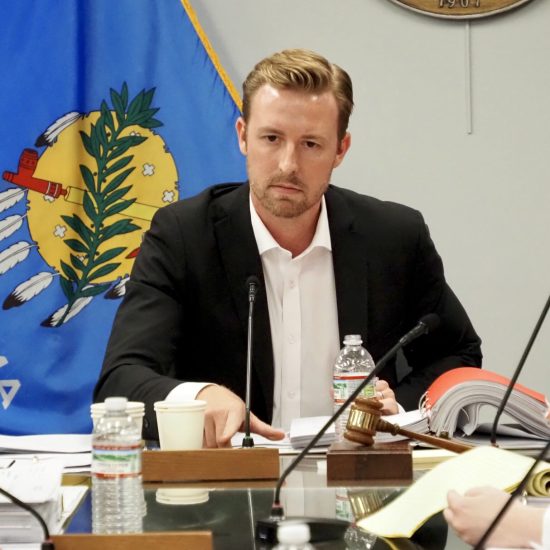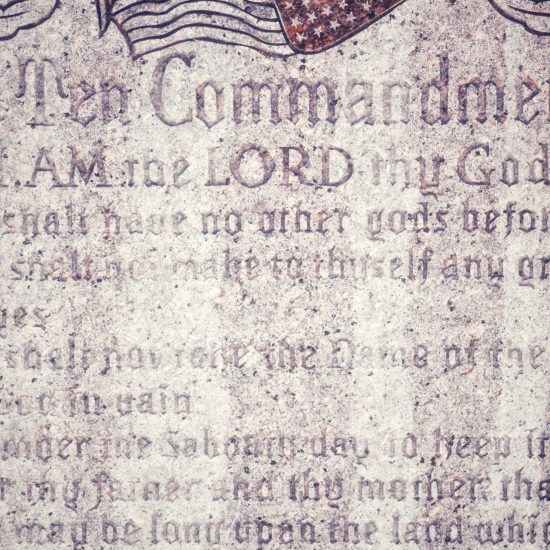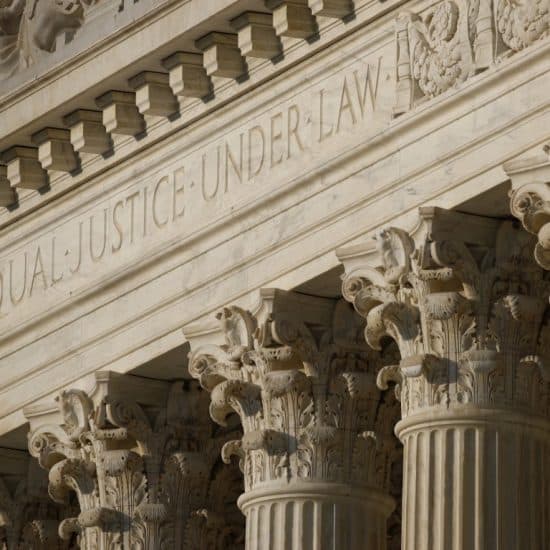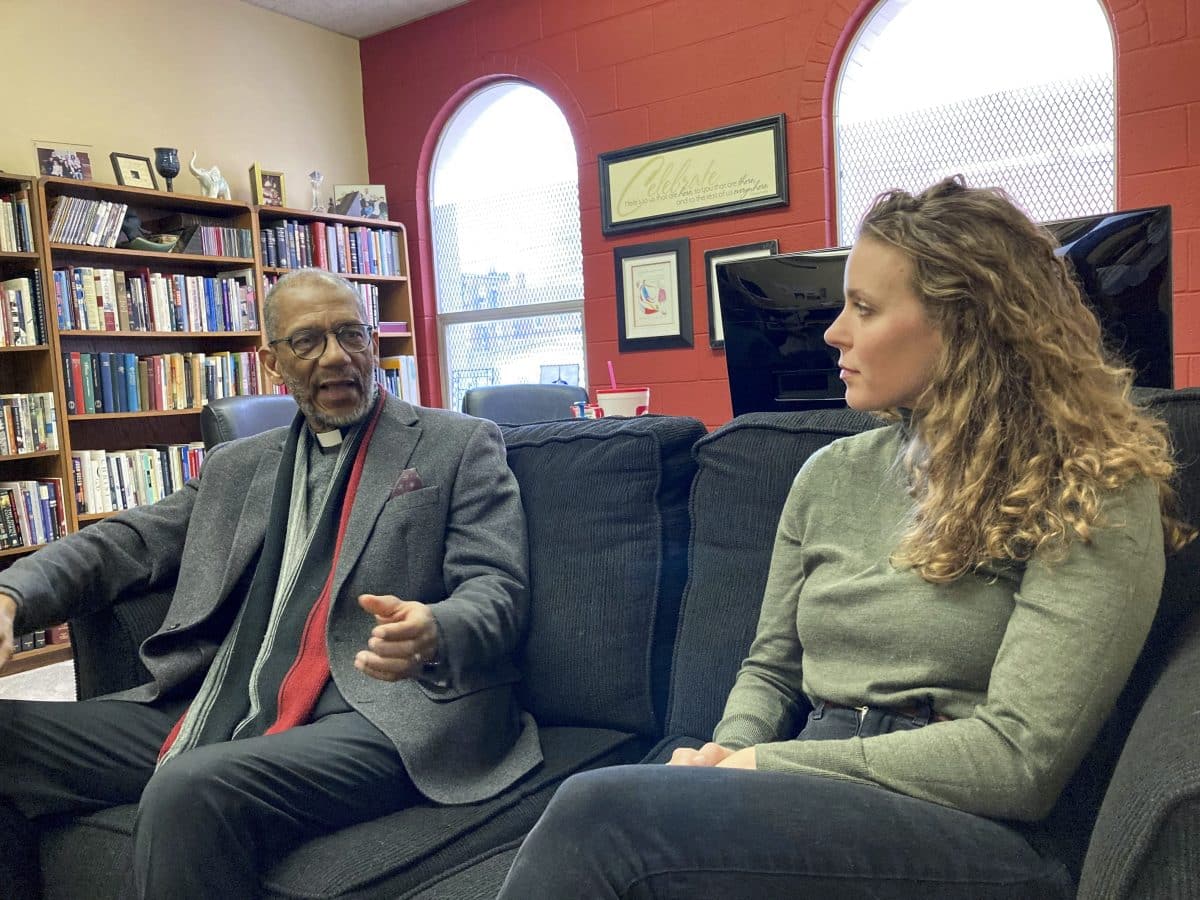
Four ministers who have been in a death chamber in recent months during state executions shared their experiences Saturday (June 24) during the annual meeting of Missourians to Abolish the Death Penalty. The “Prayer in the Chamber” event highlighted this new type of ministry that emerged after the U.S. Supreme Court ruled last year that states must allow spiritual advisors to be present and able to touch the condemned person during an execution.
The clergy who spoke Saturday don’t believe capital punishment should be practiced. But they showed up to minister in the midst of what they saw as evil.
“It’s subversive to say ‘I love you’ in a place that’s designed for death,” said Rev. Lauren Bennett, associate pastor at Metropolitan Community Church of Greater St. Louis. “It’s subversive to put your hands on someone who’s being killed and remind them of all the people who love them.”
“It’s important to remember that caring for people and showing love is a part of the resistance,” added Bennett, who was present when Missouri executed Amber McLaughlin in January. “To be in a place that is designed to kill, to be in this harsh place and be able to be a vessel of love in a place that was designed for the opposite, designed for retribution, designed to be violent, I think is something that we should hold on to a place for us to organize within.”
Rev. Melissa Potts-Bowers, a hospice chaplain in Kansas City, echoed Bennett’s comments about being present in the death chamber being “a straight-up subversive act.” Thus, she called it “a great privilege” to be there earlier this month as Missouri executed Michael Tisius because she is “horrified to think about persons being in that chamber by themselves.” So she sought to show compassion to Tisius and the staff members involved in the execution.
Rev. Jeff Hood, an activist who was present in the death chamber during the execution of Scott Eizember in Oklahoma in January and the execution of Arthur Brown in Texas in March, also said that being a witness of God’s love is what leads him into death chambers that he called “a literal hell.”
“I don’t like doing it. I don’t like going into the chamber,” Hood said. “I do feel complicit. I feel like the state thinks that my job is to keep this person calm as they’re about to kill them. I find it very disturbing. I feel like I wrestle every day with this. It is an ethical conundrum that I have not solved. But I do believe in the ministry of presence. And I believe that God has called us to be in those moments to love people and to be love in a space of great evil.”
Rev. Darryl Gray, senior pastor at Greater Fairfax Missionary Baptist Church in St. Louis, also admitted to struggling with the idea of “becoming complicit” with the execution by being there when Missouri executed Kevin Johnson last November. But the longtime advocate against the death penalty added that he didn’t want Johnson to be alone at the end. So, Gray said, he accompanied Johnson “because Kevin’s life was worth it, the sacredness of human life was worth it.”
“We probably would not have agreed to participate in his journey if we did not see our experience, our theology, our understanding as radical,” Gray added.
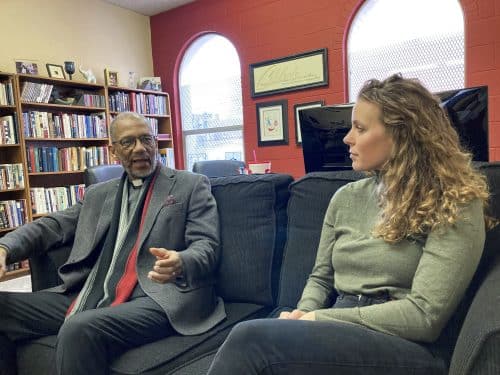
Rev. Darryl Gray (left) and Rev. Lauren Bennett speak in Bennett’s office in St. Louis, Missouri, on Jan. 10, 2023. (Jim Salter/Associated Press)
But Gray said that while he had been involved in prison ministry for decades, this was a different experience.
“Absolutely nothing — be it seminary or experience or whatever — prepared me for the journey that I took with Kevin,” Gray said. “People ask if I would ever do it again, and I don’t know. A lot of me says no.”
“I’m still not over it,” he added. “You don’t forget it. You don’t get over it. It’s not something that you do and then it’s left in that death chamber. … Kevin will always be family. I’m never going to forget Kevin Johnson.”
Potts-Bowers, who served as a spiritual advisor for Tisius for more than two decades, also shared about the impact of getting to know him as a person.
“I do speak in the present tense because of my spiritual beliefs that all these people we walked with do still exist, so I don’t use past tense with them. And so Michael grew up with our family. And he’s a part of our family,” she said. “So accompanying him in the execution chamber was horrifying for me. It was just like having a family member there and sitting with them while they’re ritually executed.”
Yet, as others noted, she felt it important to minister through her presence.
“Those of us who are following the path of Christian faith certainly see that in our leader, we have that as part of our teaching,” Potts-Bowers explained. “Being present, being there, standing with those who are oppressed is one of the most important things we can do. So for me, remaining in that chamber is one of the most important privileges for us to protect.”
That idea of being present came up during the conversation not only about being in the death chamber but also during the process of serving as a spiritual advisor.
Gray noted that his job as a spiritual advisor was “just to be there” and help give what Johnson needed. Sometimes that meant listening, sometimes that meant helping interpret Bible passages, and other times that meant talking about family. In the death chamber, Gray added, he knew Johnson was okay when Johnson said he kept his dignity — something particularly important to him as he knew the prosecutor was there watching — and he was ready to see his brother who died years earlier.
Bennett similarly shared about walking through biblical passages with McLaughlin. And the pastor noted the irony of spending this time ministering ahead of McLaughlin’s execution on the 10th day of Christmas (Jan. 3).
“It was all shrouded in Advent, this time where as Christian people we’re waiting for the birth of Jesus to come. Amber and I sat there in death and waiting for death to come,” she said. “I’m not looking forward to Advent this year.”
In addition to sharing their experiences, the four clergy also emphasized the importance of spiritual advisors being allowed to be present. Earlier this year, Missouri did not allow the Muslim spiritual advisor for Raheem Taylor in the death chamber — even after allowing Christian pastors Gray and Bennett in the preceding months. As reported at A Public Witness, the state gave inaccurate reasons for the denial and even executed Taylor while he still had an outstanding appeal on the matter. MADP Co-Director Michelle Smith said during Saturday’s panel that the fact Taylor died alone “haunts me.”
Hood recounted efforts by Oklahoma to block him from being in the death chamber. But the state ultimately allowed him in after the filing of litigation that threatened to delay the execution.
“We really pushed back against the state of Oklahoma,” he said. “You still have religious freedom in the death chamber. Religious freedom extends to that moment.”

